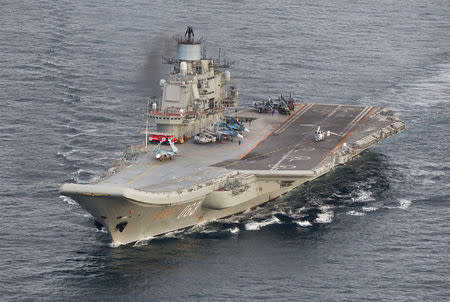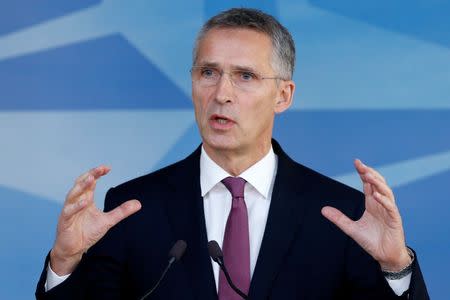Russian fleet withdraws refuel request to Spain after NATO outcry
By Sarah White and Rodrigo De Miguel MADRID (Reuters) - Russia has withdrawn a request to refuel warships in Spain's North African enclave of Ceuta, Madrid said on Wednesday, after NATO allies said their carrier battle group could be used to target civilians in Syria. Britain said earlier it had raised concerns with NATO ally Spain over its decision to allow three ships in the Russian flotilla to resupply in Ceuta on their way to the eastern Mediterranean. NATO chief Jens Stoltenberg said all allies were aware of NATO's concerns about the Russian mission. The Spanish government said it had granted permission in September for the three Russian ships to dock in Ceuta between Oct. 28 and Nov. 2 in line with its long-standing practice of allowing Russian Navy ships to visit its ports. The Foreign Ministry said it had asked the Russian Embassy in Madrid for clarification after reports that the three ships would support attacks on the embattled Syrian city of Aleppo. "The Russian Embassy in Madrid has just informed us that it is withdrawing the request for permission for stopovers for these ships and these stopovers have therefore been cancelled," the ministry said after saying earlier that it was reviewing the Russian request. The Russian embassy in Spain confirmed that Moscow had withdrawn a request for the warships to refuel in Ceuta, the RIA news agency reported. It gave no reason for the change of heart. NATO is monitoring the eight-strong carrier battle group from northern Russia on its way to the eastern Mediterranean, where alliance officials fear it will launch fighter bombers to hit rebels in northwestern Syria early in November. "SERIOUSLY?" Speaking earlier in Brussels, Stoltenberg said it was up to Spain to decide whether to refuel a Russian tanker travelling with the carrier battle group, but that NATO had expressed its concern to allies, including Madrid. "We are concerned about the potential use of this carrier group to increase attacks against civilians in Aleppo," Stoltenberg said, referring to the war-ravaged Syrian city where government forces are besieging its rebel-controlled eastern half. "All allies are aware of our concerns." British Defence Secretary Michael Fallon told reporters in Brussels that London would be "extremely concerned that any NATO member should consider assisting a Russian carrier group that might end up bombing Syrian civilians. "NATO should be standing together," he said. Britain has raised concerns with Spain over the possible refueling of Russian warships on their way to Syria, a spokeswoman for Prime Minister Theresa May said. Former Belgian prime minister Guy Verhofstadt, who leads the Liberal bloc in the European Parliament, said on Twitter: "Spain signed EU statement on Russian war crimes in Aleppo last week; today helps refuel fleet on way to commit more atrocities. Seriously?" The naval group, which passed through the English Channel on Friday, is made up of Russia's sole aircraft carrier Admiral Kuznetsov, as well as a nuclear-powered battle cruiser, two anti-submarine warships and four support vessels, likely escorted by submarines, according to NATO officials. The naval deployment is carrying dozens of fighter bombers and helicopters and is expected to join around 10 other Russian vessels already off the Syrian coast, diplomats said. Washington's envoy to NATO said Russia was within its rights to move vessels through international waters. But U.S. Ambassador Douglas Lute raised concern that the aircraft carrier would be used to contribute to bombing of civilian targets around Aleppo. (Additional reporting by Robin Emmott in Brussels and Kylie Maclellan in London; Writing by Adrian Croft; Editing by Mark Heinrich)



